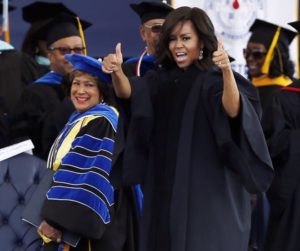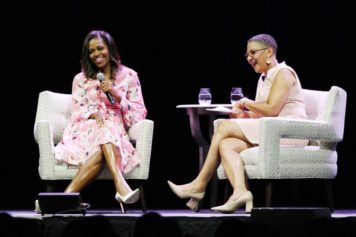
First Lady Michelle Obama delivers commencement address at Jackson State University. AP/Rogelio V. Solis
First lady Michelle Obama gave a powerful speech in Jackson, Mississippi, Saturday, where she delivered the commencement address to Jackson State University’s Spring 2016 graduating class.
The rousing speech was filled with inspirational advice and reflections on her own experiences with prejudice, particularly poignant for the crowd of 800 HBCU graduates.
“I wish I could say otherwise, graduates, but the question isn’t whether you’re going to come face-to-face with these issues; the question is how you’re going to respond when you do. Are you going to throw up your hands and say that progress will never come? Are you going to get angry or lash out? Are you going to turn inward, and just give in to despair and frustration?”
She advised the students to instead take a page out of President Barack Obama’s book and “…do what [he] has always done — as he says, “When they go low, I go high.”
She took the opportunity to reflect on Mississippi’s tumultuous past with racism and bigotry, recalling its place in key events of the civil rights era. She even gave students a history lesson, opening with a story about the very stadium they were sitting in, Mississippi Veterans Memorial Stadium.
“Back in 1962, during an Ole Miss football game, this stadium became the site of what was essentially a pro-Jim Crow rally, with fans waving Confederate flags and singing a song called ‘Never No Never’ to protest the admission of an African-American student to their university. By halftime, they’d convinced the governor to even speak. He said just three sentences. He said, “I love Mississippi. I love her people, our customs. I love and respect our heritage.” And the crowd went wild, because they knew exactly what he meant.
That game was just one small moment in a struggle of civil rights that enflamed this entire country, but often burned hottest right here in Mississippi, the state where a 14-year-old boy named Emmett Till was beaten and murdered. Where NAACP leader Medgar Evers was assassinated. Where Freedom Riders overflowed the jails. Where gunshots would ring out here on your campus, killing young people and littering one of your dorms with bullet holes still seen today.”
She acknowledged the unusual challenge for Millennials to overcome racism in today’s increasingly “volatile” climate.
“In light of today’s 24-hour news cycle, in this era where our Facebook feeds are limited to the voices of folks who think exactly like we do and our TVs and radios are exclusively tuned in to those who tell us only what we want to hear, it’s not surprising that our disagreements have become more personal, more intense. It’s not surprising that we too often demean or dismiss opinions that are different than our own,” she said.
Still, she told the graduates to be encouraged by the strides made in the country in just a generation.
“No longer can we be barred from a university or a hotel, or arrested for sitting at the front of the bus, or forced to use a separate bathroom or water fountain because of the color of our skin. No one is going to poll test us by demanding that we recite the Constitution or correctly guess the number of jelly beans in a jar before we’re allowed to vote. So, yes, we continue to make progress here in America.”
The first lady ventured into political territory with a dig at Mississippi’s newly passed religious freedom bill, which gives businesses the right to refuse service to gay and lesbian couples.
“We see it right here in Mississippi — just two weeks ago — how swiftly progress can hurtle backward,” Obama said, “how easy it is to single out a small group and marginalize them because of who they are or who they love.”
Michelle Obama, at the sunset of her husband’s legacy, is liberated, more direct and at ease with speaking her mind. The first lady has never shied away from themes of rising above racism, prejudice and low expectations. But she was often less vocal about more contentious political issues of the day.
The new first lady is not afraid to take on gun control and sexism. Is it the sign of a future in politics or simply the freedom that comes with no chance of re-election? Mrs. Obama’s recent statements point to the latter.
“I will not run for president. No, nope, not going to do it,” Obama told member’s of the audience at the South by Southwest festival in Austin, Texas, earlier this year.” She said she felt she could impact a greater number of people in a less partisan role.
“There’s a potential that my voice could be heard by many people who can’t hear me now because I’m Michelle Obama, the first lady,” she said.


